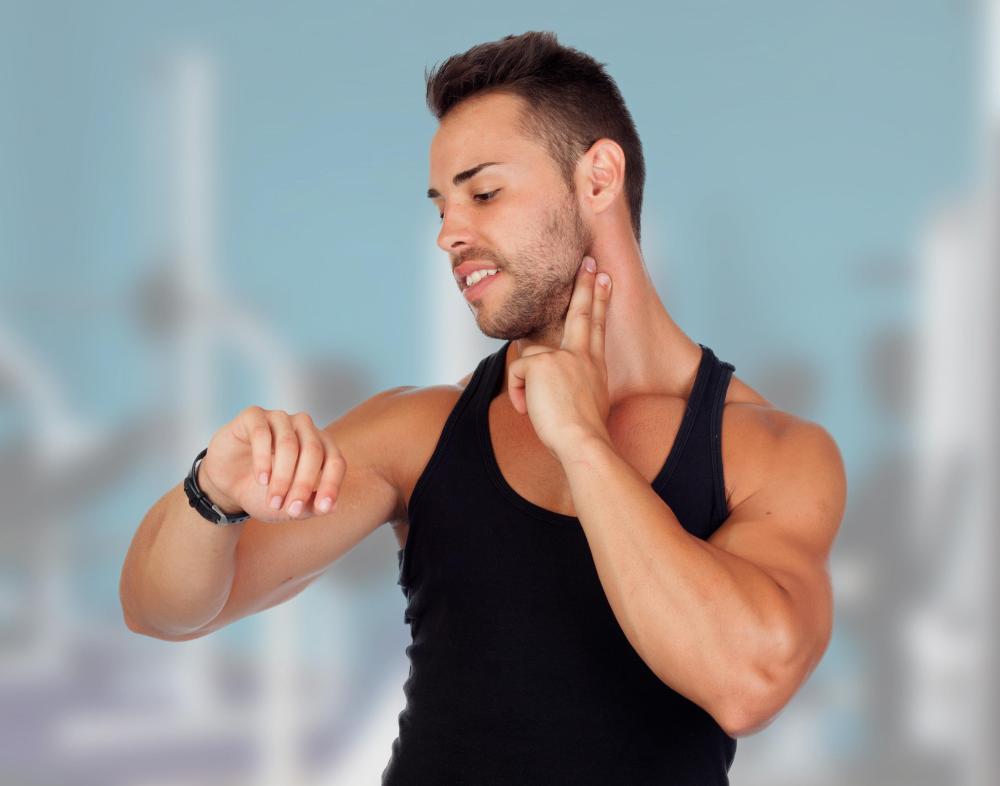At TheHealthBoard, we're committed to delivering accurate, trustworthy information. Our expert-authored content is rigorously fact-checked and sourced from credible authorities. Discover how we uphold the highest standards in providing you with reliable knowledge.
What is a Heart Rate?
Heart rate is a measurement tool that determines how fast the heart is beating. Typically, the concept is expressed by the number of beats or pulses over a given amount of time, such as beats per minute (BPM). Understanding the rate at which the heart is beating can be important to athletes as a measurement of exertion, but may also be useful to medical professionals in understanding the health of a patient.
The medical explanation of what a heartbeat does can be quite complex; essentially, the heart beats faster when the body needs more oxygen. The need for oxygen can change based on a variety of factors, such as current activity, heart condition, or general health. Monitoring this rate can allow a person to know how hard the heart is working to provide oxygenated blood throughout the entire body.

There are a variety of ways to measure the rate of heart beats, though many basic methods provide only a general range. The simplest is by finding a pulse point on the body — the most easily located are generally on the wrist directly below the first finger or on the side of the throat. These points are on shallow arteries that bulge when blood passes through them, creating a steady beat, or pulse. To measure heart rate using a pulse point, a person can count how many beats occur in six seconds. Multiply that number by ten, and it will give a good estimate of the BPM.

When the body is at rest, such as sitting or sleeping for a long period, the rate at which the heart beats tends to be low. This is called the resting heart rate, and in most people, it is between 60-100 BPM. Some athletes or very fit adults may have a lower resting rate, which is usually a sign of excellent cardiovascular health. People with an unusually low rate may have a condition called bradycardia, which can cause health problems, as the heart is not able to transmit enough oxygen throughout the body. Those with an unusually high resting rate may suffer from tachycardia, which may increase the risk of heart attack or stroke.

For athletes, measuring heart rate helps keep track of their exertion level and performance. Heart rate training for exercises involves finding out what the maximum healthy measurement is for someone's age and fitness level, then trying to keep the heart beating at a certain percentage of that maximum during a workout. For instance, health and fitness experts say that more fat is burned when the heart is beating at 60% of the exerciser's maximum recommended rate. At 70%-80%, although the person is working harder, more carbohydrates are burned instead of fat. The percentage that an athlete tries to achieve is often called the target heart rate.
AS FEATURED ON:
AS FEATURED ON:
















Discussion Comments
@healthy4life - Good observation, since the rate of the heart beat is directly tied to blood pressure.
Something else I have noticed when I am checking my heart rate is that it changes slightly depending on whether I am breathing in or out. Whenever I inhale, my heart speeds up for a couple of seconds and then returns to normal. I figure this is because the oxygen going into my lungs needs to go somewhere quickly, so the heart speeds up.
Because of this, I don't completely agree with just checking your heart rate for 6 seconds and multiplying by 10. I always like to make sure that I get a couple of breaths in while I'm checking my heart rate. I usually go for at least 15 seconds and preferably 30. I guess the other option is just to get something like a heart rate watch which will give you instant results.
@jmc88 - I would suggest searching around online for a heart rate chart. You can find tools that will tell you what your heart rate should be for your age and health. It sounds like you are probably fine, though.
I am 24 and have a resting rate around 60 and usually get up to around 150 when I am exercising. Like always, though, if you are concerned, I would definitely check with your doctor. Since you mentioned that you have just started exercising, you will probably have a higher heart rate than someone who exercises regularly. You'll need a couple of weeks for the heart to strengthen.
Does anyone know what the normal heartbeat is for someone in their mid-30s? I just checked right now while I've been sitting here, and it was about 70 BPM. Is that normal, and how can I tell?
I am only wondering, because I have recently started exercising again. I went to the gym the other day and rode on an exercise bike for a while, and my heart rate afterwards was 150. That seemed a bit high. I thought that a normal heart rate after exercise was usually around 120. Considering that the article mentions 60-100 being a good resting rate, maybe I am wrong. That would even suggest that I am on the low side. Does anyone know?
@Perdido - When you are checking your pulse in your wrist or neck, one if the things that wasn't mentioned is that you need to make sure your thumb isn't touching the area. I don't remember the science behind it, but somehow our thumbs have a slightly different pulse than the rest of our body, and it can throw off being able to track the beats.
The other thing that a lot of people don't think about when they are measuring heart rate is just to put your hand over your heart and count that way. That is the source, after all.
I find that after I have been doing heavy exercise for a while that keeping track of the beats on my wrist or neck is too difficult. Instead, I just opt for counting them straight from my heart, since it is easy to feel them at that point.
My blood pressure machine has a heart rate monitor that I watch while taking my blood pressure. It has an image of a beating heart out beside it, and the rate tends to go up and down a few times during the minute or two that it takes to check my pressure.
I have noticed that when my blood pressure is high, so is my heart rate. A low pressure reading is accompanied by a low heart rate, so they seem to be tied together.
I take blood pressure medication to keep it in check, so I have to monitor it now and then. I can usually tell when my pressure is rising, because I feel my heart rate going up for no reason.
When I do certain types of exercise, my heart rate skyrockets. I feel a pain in my chest, and I have trouble getting enough air in my lungs.
This happens whenever I try to run for exercise. I just get out of breath so easily when running. However, when I walk briskly or do other sorts of exercise, my heart doesn't feel like it is about to burst.
So, I will leave running to the professionals. I think it's probably not healthy for me to be exerting my heart and lungs to the point of pain and an incredibly high heart rate.
@Perdido - I had trouble finding my husband's pulse point when he asked me to the first time. I tried his neck and his wrists, but I felt nothing.
At first, I thought maybe he just had such a slow heart rate that I couldn't detect it. Then, I looked at his ankle.
I could actually see his heart beating there through his skin. The skin rose up with every beat, which made it look extremely thin.
I was able to discern his heart rate without even touching the area. I just watched and counted the beats.
What can I do if I can't feel my pulse in my wrists or in my neck? I can only feel a very slight rhythm there, even when I press down hard. Is there anywhere else on my body that I can check for it?
Post your comments